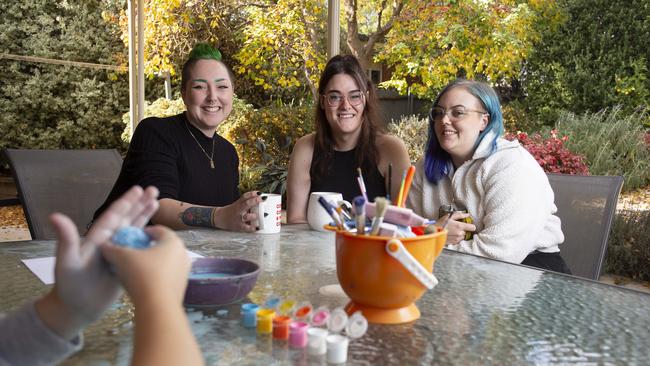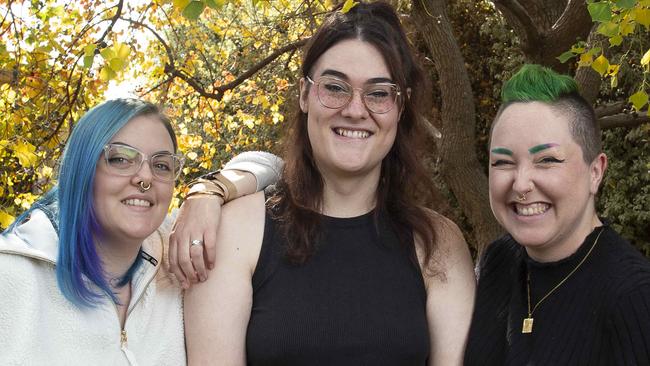Inside ethical non-monogamy, the relationship status trending up for all generations
Ethical non-monogamy is on the rise – and for people like Dr Eden Thain, her live-in love of 14 years, her new lover and her platonic partner, it works well.
Lifestyle
Don't miss out on the headlines from Lifestyle. Followed categories will be added to My News.
It’s a typical Thursday and polyamorous Eden Thain is looking forward to dinner and a night in with her new love, Wren Birch, who she met six months ago.
Her “nesting” partner of 14 years, co-parent of their five-year-old son and co-owner of their Para Hills home – Tyler Carson – is at lunch with one of two long-term partners and is eating out with the other that night.
The night before, all five ate together as one big, happy family for a fun pizza dinner.
This is a normal day in the life of Dr Thain, a university research fellow leading a loving and fulfilling polyamorous life in Adelaide.

Polyamory comes under the umbrella term of ethical non-monogamy, which is the romantic life of choice for a growing cohort of Gen Z daters.
About 20 per cent of the population will try it at some point in their lives and a survey by dating app Bumble shows nearly half of those in relationships agree that ENM is the way of the future.
Dr Thain has been with her nesting partner and “high-school sweetheart” since she was 16 and living as a “young man with a big, woolly beard” before her transition into a woman two years ago.
The 30-year-old also has a new, six-month relationship with a “gorgeous” non-binary person, who she met after matching on four different dating apps.
And there’s also a four-year queer platonic relationship with a “best friend”, who she is not intimate with.
Her nesting partner has two long-term partners of their own – and Dr Thain has lived with both of them at different times over the past four years.
“They all like each other, they’re all friendly with each other,” says Dr Thain, who has a PhD in psychology.
“We’ve both got multiple partners and we’ve been polyamorous for about 10 years. Obviously, relationships interact with gender and sex … I was like ‘why don’t we see if we can find sex and love and passion from other people but stay whatever we can stay’. I don’t think our relationship’s ever been stronger.
“In polyamory, it’s about being open and happy in your relationships.”
‘MAYBE I WON’T BRING THAT UP’
Dr Thain says there’s still “quite a heavy stigma” about admitting to being involved in the ENM community, with New Zealand research showing people are more comfortable with talking about their gender and sexuality than opening up about being in the ENM community.
“I’m definitely that way. I’m happy to talk about being a queer transwoman but when someone starts talking about polyamory I’m like ‘maybe I won’t bring that up to people’,” says the university lecturer, who is an administrator for the Polyamory Adelaide Facebook page.
“It comes with a bunch of strange questions … they ask all the wrong questions.”
But the Millennial says she can see the appeal of ENM relationships for the younger generation of Gen Zers, who have liberated themselves from that stigma.
They are also not bothered by another big ENM hurdle – the fairly unglamorous reality of having to take regular tests for sexually transmitted diseases.
“Gen Z teenagers seem very, very engaged in the idea of ‘but why can’t I love multiple people?’,” she says.
“The real reason in recent memory is the AIDS crisis, the strong idea that if you have multiple sexual partners, you’ll get a disease and die.
“Young people are very open to have STI tests, it’s getting more and more accepted as a normal, everyday part of life. So that gets that big stigma out of the way for a lot of young people. If I’m going to get tested regularly, I can sleep with more than one person.”
‘WE ALL HAVE MANY LOVES’
Dr Thain says most people are polyamorous in their lives, loving many people platonically.
She also suspects there are many who live non-monogamous lives but keep that truth a secret.
“Everyone is polyamorous, everyone has multiple loves, it’s just not a full, pragmatic relationship with completely committed love,” she says.
“A new kid is born, you don’t need to come up with new love, you don’t have to take love away from other ones, you just get more love.
“I’m pretty sure a bunch of people who say they’re monogamous … but it’s an open secret. There is a form of ENM called ‘don’t ask, don’t tell’ where you’re in a relationship with someone and you’re both free to go sleep with people or pursue things with other people but if your partner never asks and you never tell then your relationship will go fine. I’m sure it works for some people, we’ll never know because they don’t ask, don’t tell.”
ONE BIG FAMILY
Dr Thain says the couple’s son is being raised in the loving arms of her polyamorous community.
Her nesting partner’s two lovers both play a special role in the young boy’s life.
“My son doesn’t call them uncle but they’re his uncles. They’ve always been in his life because they’ve been with my partner since before he was born. He will turn to them when he needs them,” she says.
“I was polyamorous for a long time before my partner got pregnant and then my mother went ‘does that mean you’re not going to be polyamorous anymore?’. I was like ‘why would we stop being polyamorous, why would having a child stop that?’ and since having a kid it’s been one of the best parts of my life, to have those people around my kid, looking after him, helping him.”

MOVING TO A NEW AGE
Relationships have already evolved and monogamy in 2024 is a far cry from the 1950s, when couples were experted to meet one person, court them, only sleep with them after they married and be together until one of them died.
Today, a monogamous couple can have multiple partners before choosing someone to settle down with – and if that doesn’t work, they can divorce and start over again.
“That monogamy is actually only a couple of generations old,” says Eden.
“Relationships have changed so quickly … maybe this (ENM) is the thing that will be around for the next three generations and then it will change into something else.
“I don’t think young people are looking for something in polyamory, I think they’re seeing deficits in what’s being offered to them. And that’s across the board – jobs, housing, mental health … and then when they’re told it’s going to be you and one other person up against the world, they say ‘that’s a sh-t lot’.
“I think everyone has that polyamorous vibe and the contentious thing is I think everyone probably wishes they could be polyamorous in that way … a lot of husbands and wives wish they could have sex with someone else and it feel really good and it not ruin their marriage.”
‘FREAKED OUT’
Adelaide medical sexologist Marie Tudor says she has seen an increase in the number of lovers wanting help to navigate the complexities – and sometimes emotional distress – of pursuing ENM in their relationships.
Dr Tudor, a GP trained in sex therapy, says clients who seek out her help are usually those who have explored ENM and “freaked out” about their spouse enjoying sex with a new lover – not those who were comfortable and happy in their new relationships.
“Usually I see a couple because someone’s been upset seeing their husband or wife or partner having sex and a good time with someone else, that’s quite a common thing,” she says.
“Usually it’s the one that wanted the non-monogamy, who suggested this open marriage situation, who can’t handle seeing his wife being with a man. The husband freaked out seeing his wife having a good time with a 19-year-old.”
JEALOUSY’S A CURSE
Embracing a polyamorous life was a concerted choice for Dr Thain and her partner but it still raised uncomfortable feelings.
She admits to having pangs of jealousy when her partner was on a date – and it saw her turn to her studies in psychology to work through them.
“I had a lot of tools to work on myself but I did experience that jealousy,” she says.
“It’s a journey to get there, you have to go through jealousy, worries, looking at yourself and what you have to offer other people, but you hopefully get to that point where you’re like ‘I’m really happy my partner has other partners’.
“And if that’s your goal, to make sure your partner is happy, you’ll end up happy.”





